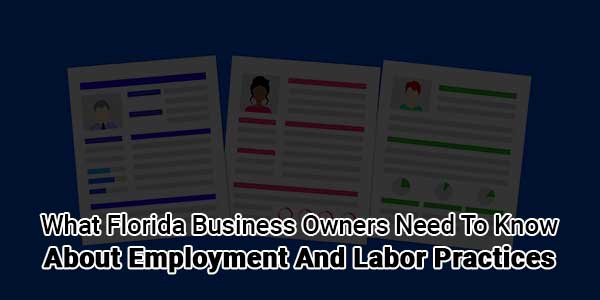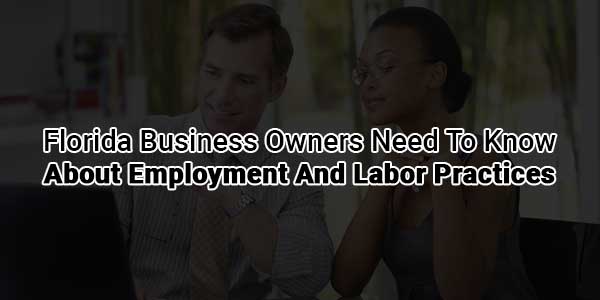
There are numerous federal and state laws that regulate the relations between employers and employees. It is important that every employer in the state of Florida is aware of these laws—not only to avoid legal problems but also to demonstrate that their concern for the welfare and professional satisfaction of their employees.
When it comes to employment law, there is a lot to review and understand; and while this isn’t a comprehensive list, it’s a good place to start to get to know your responsibilities and your employees’ rights.
Table of Contents
Hiring And Employment Practices:
Under the laws applied by the U.S. Equal Employment Opportunity Commission (EEOC) in all 50 states, it’s illegal to discriminate against a job seeker or employee for the following reasons, also known as protected classes:
- Race
- Color
- National origin
- Religion
- Sex (including pregnancy, childbirth, and any related medical conditions)
- Sexual orientation
- Gender identity
- Disability
- Age (40 or older)
- Citizenship status
- Genetic information
In the specific case of the state of Florida, there are also specific laws that prohibit discrimination based on:
- Marital status
- A positive diagnosis of AIDS or HIV
- Sickle cell trait
Employers should be aware that anti-discrimination laws also apply when firing a worker. Federal law makes it illegal to retaliate against an employee or former employee if they report being discriminated against, filed a charge of discrimination, or participated in an employment discrimination investigation or prosecution.
Hours, Wages, And Child Labor:
Federal and state laws regulate the wage rates an employer can pay, the hours an employer must compensate their employees for, and cases of child labor. Each state determines its own wage and hour laws, which are as follows in the state of Florida:
- Hours Worked– Florida adopts the regulations of the Fair Labor Standards Act (FLSA) regarding hours worked. According to the law, an employee’s workweek in the United States is 40 hours long, divided into a period of eight consecutive hours in five days, with at least eight hours of rest between shifts. Any change in this pattern is considered prolonged or unusual and requires payment of overtime, but there are exceptions for some categories. To learn more about it, see the S. Department of Labor website.
- Minimum Wage– The Florida Department of Economic Opportunity estimated the minimum wage to be practiced in the state in 2021 at $8.56, effective from January 1, 2021. This amount is higher than the federal minimum wage, currently at $7.25.
- Child Labor– Florida has its own child labor laws, which prohibit children 13 and under from working in the state, except in certain specific situations (such as domestic or farm work). Children aged 14 and 15 may work in some jobs, but their working hours are limited so they can attend school. Details on Florida’s child labor laws are listed in the State Statutes.

Employee Leave:
Leave laws to determine the circumstances under which an employer must allow their employees to take time off work, on paid or unpaid leave. Here’s a summary of what the Florida Leave Laws say:
- Vacation Leave– Florida has no specific laws regarding vacation leave, paid or unpaid. Therefore, employers are free to establish their own policies.
- Sick Leave– The employer is free to grant or not grant medical leave to their employees, but there are cases in which an employer may be required to grant unpaid sick leave under federal law.
- Bereavement Leave– Florida law does not require employers to grant leave for employees to grieve or to attend funerals, but the employer may choose to do so.
- Holiday Leave– Florida private employers may require an employee to work on holidays, but they also may be required to pay overtime under the law.
- State Holidays– There are several holidays recognized by the state of Florida, but private employers are not required to close their business on any of them and can choose to pay overtime for employees who work on those days.
- Jury Duty Leave– An employer cannot penalize an employee summoned to serve as a juror, but neither are they required to pay them during their leave.
- Voting Leave– Granting time off to vote is not required by Florida law, but the employer also cannot fire or threaten to fire an employee who decides to do so.
OSHA Regulations And Workers’ Compensation State Laws:
The U.S. Department of Labor’s Occupational Safety and Health Administration (OSHA) regulates the employer’s primary responsibilities for ensuring a safe workplace. For example, making sure that workers have safe and properly maintained tools and equipment at their disposal and providing medical examinations or training to the employees.
Florida law requires that most companies have workers’ compensation insurance coverage. In the event of a work-related injury or occupational illness, these benefits can help pay for lost wages, legal fees, medical expenses, and funeral costs in the case of a fatality. The following companies types are required to have workers’ comp under Florida law:
- Employers in the construction industry with one or more employees
- Employers in agriculture with at least six regular employees (If the employee has 12 temporary workers who work more than 30 days during a season, but less than 45 days in a year, they also must have coverage.)
- Employers from all other industries with four or more employees
However, certain workers can apply for a workers’ compensation exemption. You can click here to learn more about Florida workers compensation exemption options and how to apply if you meet any of the following criteria:
- Corporate executives or members of limited liability companies (LLC) in the construction industry
- An officer of a corporation outside of the construction industry
- LLC members from sectors other than construction may also apply, but the applicant must have at least 10 percent ownership of the LLC, and the company cannot have more than 10 exempt members
Required Postings:
Florida-based companies are also required to display posters with useful information about federal and state labor laws in places where they are visible to the workers. These posters contain details about minimum wage, job safety, and the Family and Medical Leave Act, among others.
The Importance Of Understanding Employment Law:
If you’re a Florida business owner who wants to ensure compliance with all labor laws required by federal and state laws, there’s a lot of information to learn and apply. Large companies often have HR professionals and legal advisors to deal with these issues, but for the small business owner, the task can require quite a bit of time and research.
The guidelines above can help any employer become more aware of the basics of employment and labor laws. Remember that not paying due attention to these issues can result in financial penalties and serious legal action.


















Be the first to write a comment.